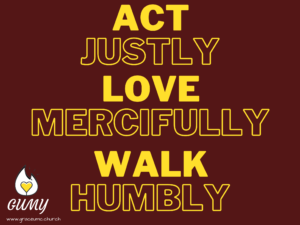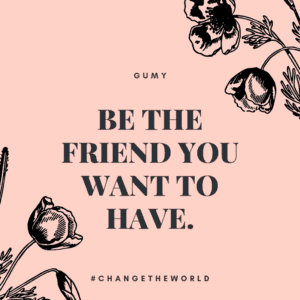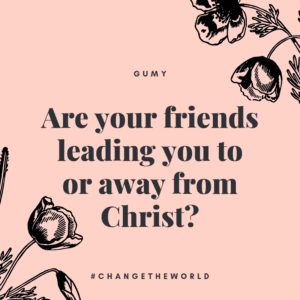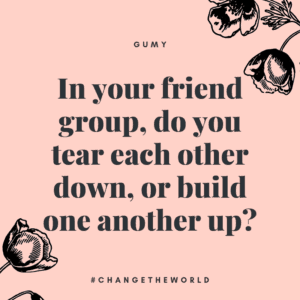2020
Engaging with the Election and Your Student
“Let us embrace and lift one another up in these trying times. Love thy neighbor as thyself. Do not stand aside. Inaction is an action in itself. I’m asking you to vote. I’m asking you to listen. I’m asking you to bring the conversation to us. But most importantly, I’m asking you to love because to love is to live.”
Process your own emotions and make home a safe space.
Students can see that we’re on edge. Be honest and tell them, “I’m is a little nervous about the election.” It’s helpful for youth’ social and emotional development to hear you naming your emotions. It also gives them the space and opportunity to be vulnerable and share their own anxieties or hopes. Behavior begets behavior: if we’re desiring to know what our students are thinking, nervous about, or desiring, it is helpful to model that first and give them permission to do so. It also helps them learn how to respond to when someone is being vulnerable or sharing.
Ask: “What have you heard and how are you feeling?”
As you all know, this question is a great question to ask at any time — even when there is no election, no protests, no pandemic casting a long shadow over our lives. I like to add the follow-up question of “Where do you see God in that?”. As Karl Barth once quipped, Christians need to read the newspaper in one hand, and the Bible in the other.”
Use this as a learning opportunity
Election time is a perfect opportunity to help youth build up a foundation of knowledge. Take a look at all the state maps online. For slightly older youth, you can talk about the origins of the Electoral College, during the Constitutional Convention in 1787. If they’re fans of the musical Hamilton, you can put on “Cabinet Battle #1” for some great context. Many youth, myself included, are never taught about the governmental structures or the historical ramifications of decisions made by people in power. We often think of history as something that just happened, rather than something that has been created, decided, and enacted.
Put the election in the context of history — including our “hard history”
Our youth are living through history. It’s good to have perspective on the highs and lows that came before. (Honestly, it’s sort of helpful for grownups too!) We’ve studied this semester and in Peace Academy that God has a special place in his heart (and Kingdom) for those who are oppressed, victims of injustice, the poor, the abused by power. To gloss over that aspect of our nation’s history is not only to be deceitful, but terrible theology. It to ignore a critical part of God’s heart, and the life mission of Jesus, as well as the charge given to the Church.
Don’t demonize the other side. We need to teach kids the fine art of tolerant disagreement.
It feels like the United States has never been so divided. It can be tempting to stay in our safe bubbles and bash our opponents. But, that is not the way of Christ, or the way of His Kingdom and Church. Jesus, the Apostle Paul and our founder John Wesley state that unity is perhaps the greatest demonstration of love, especially unity in opposing views and beliefs. As Jesus claims in John 13, our love will be the only defining characteristic of our discipleship, and He goes even further to state that the greatest test of our discipleship is how easily and readily we love, pray for, and choose the good of those we dislike.
2020
I’m Asking You To Listen: from GUMY Student Chloe
The 2020 presidential election is no doubt on many of our minds right now. Those eighteen and over get to exercise their constitutional right to vote. However, this leaves a large percentage of the population unrepresented. In the 2010 census it was found that 24% of America’s total population is under the age of 18.
We depend on you to act in the best interest of us. But what is our best interest?
Up until recently “the conversation” of politics has been largely confined to adults. Now, with plenty of issues threatening our future, kids are starting to get involved. From March For Our Lives to Project Drawdown and beyond, there has been a wave of political activism from students.
Did you know that we practice active shooter drills in school now? I was on crutches last time and had to crutch around the perimeter while teachers pointed out exits and where we were to run to. We also practice hiding out of sight and/or barricading the door.
I’ve never been asked how it feels to prepare for something as traumatic as a school shooter. We’ve heard those who have been through it. We’ve heard those in charge of laws related to it. We haven’t heard how the rest of us feel, the ones who feel as though they’re waiting for the worst.
Now we urge you to hear us. This not those 18 and over only’s America, it is all of ours. We too are affected by legislation passed by those in charge. So why do we not get a voice in the election of these officials? I urge you to consider listening to those not yet old enough to vote. I could go on about how we see these policies at work in our lives but if you’ve made it this far in the article then you already know that.
There’s so much fear and worry; so much hate and division. We are so much more similar than we are different. We all just want what’s best. That may look different to different people but the effect is the same: happiness, security, liberty, the right to live with freedom and equality.
I was born on November 4th, just one day after the cutoff to vote in the upcoming election. That has not decreased my own political activism this year. See, there’s a choice to be made. This choice cannot be made without informed consent. Listen. People are not marching without reason.
“Open your eyes and see what you can with them before they close forever” (All the Light We Cannot See).
Maybe you don’t agree. That’s ok. What’s not ok is to tune out others. We have to listen to each other now. We have to think, understand, and empathize. We are a deeply divided nation. It is times like these that we must recognize that we are all children of God. We must not think only of ourselves and our interests but of those who need us to fight for them. A lot of those people are not of legal age to vote.
Let us embrace and lift one another up in these trying times. Love thy neighbor as thyself. Do not stand aside. Inaction is an action in itself. I’m asking you to vote. I’m asking you to listen. I’m asking you to bring the conversation to us. But most importantly, I’m asking you to love because to love is to live.
“My command is this: Love each other as I have loved you.” (John 15:12
2020
The 6:8 Campaign

As we continue in October, we continue in our Micah 6:8 Campaign. The Old Testament prophet expressed the frustration of his people to God, begging God for advice and instruction on what to do with their lives, and on how to live. Micah, shares what the Lord’s response was: to act justly, to love mercifully, and to walk humbly with God. This is still what God expects of us today.
Our focus in GUMY is to become the kinds of people, and to be the kind of community, that embodies this verse. So, what does it mean to act justly, to love mercifully and to walk humbly with God? John Wesley, the founder of the Methodist movement, simplifies Micah 6:8 with his three simple rules:
- Do No Harm
- Do Good
- Do the things that keep you in love with God, with others, and with your own self.
Over the next few weeks we’ll be discussing what each one of these means in greater depth. But for now, we can ask ourselves: is what I’m doing (or about to do) causing harm? Is it adding benefit and good to the life of another or to my own life? Is it drawing me into a more loving relationship with God, with others and with myself?
It is election season, which is an important season. For many of our youth, they are not old enough to vote, yet, are drastically impacted by both the election season and the election results. As adults, the way you engage in political rhetoric impacts your students. So, is the rhetoric you’re sharing doing harm, causing good, and drawing you and your family into a more loving harmony?
Furthermore, while youth can’t vote in the ballot, they do vote everyday with their attention, finances, clicks, consents and protests.
Each action we take is a vote for the kind of world we want to live in, and the kind of person we want to be.
What we spend our money on, or click on, or scroll through, or corporations we support or avoid, are all votes. So, as parents, leaders and care-givers are we modeling and empowering our youth to do no harm, do good, and do what keeps us in love in the ways we spend our time, money and attention?
Try this question with your youth and family:
What is one simple action we can take this week to do good? Or, what is one action we can stop taking that is causing harm?
We have yard signs (it is the season of yard signs!) with the verse from Micah 6:8. If you would like one for your yard, send an email to [email protected] and we will get one to you.
2019
The Importance of Friendships

As we chatted about friendships in GUMY in our first week of our series “Real Friends”, we began by acknowledging that friendships are not something we just receive, but also, something that requires effort, love and resources from us. It is so easy to wish for better friends, or for our friends to be different, or treat us in a certain way. However, like Ghandi mentioned, we start by first changing ourselves. As friends, we start by being the kind of person we want to have as our friend.

In week two, we studied the passage of the friends bringing their pal on a mat to Jesus for healing. In the story, Jesus sees the faith of the friends, and heals the man. What a staggering reminder of the impact our friends can have! This begged two questions for us to consider:
- Are my friends leading me to our away from Jesus?
- Am I leading my friends to or away from Jesus?
Each one of our friends leads us to a certain way of living and viewing the world. And each one of us leads our friends. The question always is, “where?”

In the third week of our series, we addressed that sometimes we are friends with people who are not healthy for us to be friends with. We may have friends who tear us down, gossip about us, use us selfishly, and don’t defend us when our name is being run through the mud. Are these really the kind of relationships we want to have, and devote our time and energy to? Sometimes we may think we aren’t deserving of a healthy friendship, or someone who truly does love and honor us. However, the truth is, God desires us to have friends who build us up and spur us onto holiness, and and He wants us to be a friend who serves, loves, and supports another.
